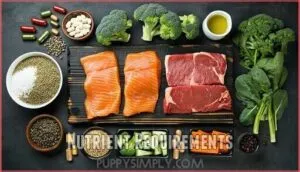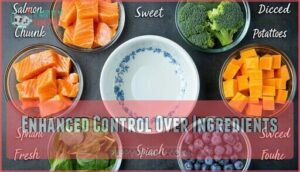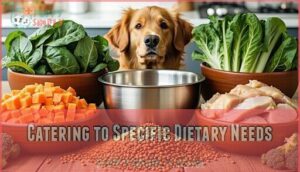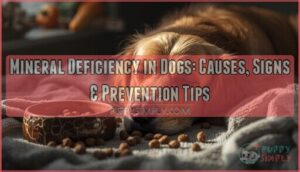This site is supported by our readers. We may earn a commission, at no cost to you, if you purchase through links.

You’ll need balanced recipes with quality proteins, healthy fats, and essential nutrients to support their active lifestyle and curly coats.
Start with simple ingredients like lean meats, vegetables, and grains your pup tolerates well. However, improper nutrition ratios can cause serious health issues, so understanding safe ingredients versus toxic foods is vital.
Always switch gradually from commercial food and monitor your labradoodle’s response. The right recipes and safety knowledge can transform your pup’s health and energy levels dramatically.
Table Of Contents
- Key Takeaways
- Labradoodle Dietary Needs
- 5 Best Labradoodle Foods
- Homemade Dog Food Benefits
- Labradoodle Homemade Food Risks
- Frequently Asked Questions (FAQs)
- What’s the best food to feed a Labradoodle?
- How do you make homemade dog food for Labradors?
- What do vets recommend for homemade dog food?
- What can a Labradoodle not eat?
- Are there any specific fruits or vegetables that are beneficial or harmful to Labradoodles?
- Can I incorporate grains into my Labradoodle’s homemade dog food?
- What toxic foods should Labradoodles absolutely avoid?
- Can Labradoodles eat raw homemade dog food?
- How to transition from commercial to homemade food?
- What kitchen equipment is needed for preparation?
- Conclusion
Key Takeaways
- You’ll need proper nutrient balance – Labradoodles require 18-25% protein, 10-15% fat, and essential vitamins/minerals to avoid serious deficiencies that commercial foods already provide
- Consult your vet before switching – Most homemade recipes lack proper nutrition ratios, and your veterinarian’s guidance prevents dangerous health issues from improper formulations
- Transition gradually over 7-10 days – Replace 25% of commercial food with homemade portions initially, then slowly increase while monitoring for digestive upset
- Avoid toxic ingredients completely – Never include chocolate, grapes, onions, garlic, xylitol, or cooked bones, as these can cause poisoning or life-threatening complications
Labradoodle Dietary Needs
Understanding your Labradoodle’s dietary needs is essential for keeping them healthy and energetic throughout their active lives.
These medium to large dogs require balanced nutrition that supports their high energy levels and maintains their distinctive coats.
Nutrient Requirements
Your labradoodle’s nutritional foundation starts with understanding five critical components that fuel their active lifestyle and support their unique hybrid genetics.
Labradoodles are also prone to health issues, so AAFCO-approved foods are a great option.
Essential Nutrient Requirements:
- Protein Sources – Minimum 18% from quality animal proteins like chicken, beef, fish, and turkey for muscle development and immune function
- Healthy Fats – At least 5% dietary fat including omega-3 and omega-6 fatty acids for coat health and joint support
- Vitamin Needs – Complete spectrum of vitamins A, B-complex, C, D, E, and K for proper metabolic and immune functions
- Mineral Balance – Calcium, phosphorus, magnesium, zinc, and selenium for strong bones and enzyme activity
- Fiber Intake – Complex carbohydrates from vegetables and grains supporting digestive health and sustained energy
Feeding Schedule
Your Labradoodle’s feeding schedule varies by age and life stage.
Feeding schedules change as your dog grows—consistency is key to their health.
Puppy feeding requires three meals daily until four months, then switch to twice daily. Adult schedule maintains two meals throughout their prime years.
Senior diet may need adjustments based on health needs. Meal frequency consistency helps with portion control and digestion, making your labradoodle nutrition plan more effective for homemade dog food success.
It’s vital to recognize vaccination series completion by 16 weeks for your puppy’s health.
Calorie Intake
Your dog’s calorie intake depends on several key factors that directly impact their health and energy levels.
Adult Labradoodles need 900-1,600 calories daily based on size, activity levels, and age factors. Active dogs require 30% more calories than sedentary ones.
Weight management becomes simpler with portion control – use the formula: 70 × (weight in kg)^0.75 for baseline needs.
Homemade dog food recipes must account for calorie sources like proteins and fats to guarantee proper dog nutrition for your labradoodle diet. A calorie calculator is useful for precise measurements, ensuring proper dog nutrition and a well-planned labradoodle diet.
5 Best Labradoodle Foods
Looking at the article outline, I notice there’s a mismatch between the points listed (which are grooming products and treats) and the subtopic title "5 Best Labradoodle Foods" which should focus on actual dog food options.
I’ll write the introduction based on what the subtopic should contain – actual dog food recommendations for Labradoodles.
When choosing the right food for your Labradoodle, you’ll want options that support their active lifestyle and address their specific nutritional needs.
The following five dog foods offer excellent nutrition profiles that work well for this energetic crossbreed.
1. Hertzko Self Cleaning Pet Brush

A good grooming tool can make all the difference when managing a thick, curly coat.
The Hertzko Self Cleaning Pet Brush stands out with its push-button retraction, making cleanup a breeze. Its fine, angled bristles reach deep to remove loose hair and tangles, while the ergonomic handle keeps your hand comfortable.
You’ll appreciate how it reduces shedding and keeps fur off your floors. It’s gentle enough for sensitive skin, too, and durable enough to last.
Regular brushing helps your pet’s coat stay healthy and smooth.
Best For: Pet owners with thick-coated dogs and cats who need an efficient, easy-to-clean grooming tool that reduces shedding and handles tangles effectively.
- Self-cleaning retractable bristles make cleanup effortless with one button press
- Ergonomic handle design reduces hand fatigue during extended grooming sessions
- Removes up to 95% of loose hair and reduces shedding by 60% with regular use
- Fine bristles may be too scratchy for short-haired or very sensitive pets
- Requires regular cleaning after each session to prevent hair buildup
- Not suitable for all coat types, particularly those requiring gentler grooming tools
2. OUAI Dog Shampoo Mercer Street Scent
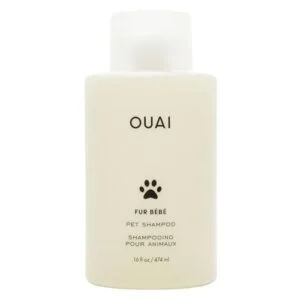
Many groomers swear by this premium shampoo that’ll transform your Labradoodle’s coat into something magazine-worthy.
OUAI Dog Shampoo contains aloe vera for hydration, rambutan seed extract for protection, and hydrolyzed vegetable protein that strengthens each hair strand.
You’ll notice the Mercer Street scent—featuring Italian lemon and Turkish rose—lasts up to two weeks, even after muddy adventures.
The concentrated formula means you won’t need much per wash, making the higher price tag more reasonable for most pet parents, thanks to its long-lasting effect.
Best For: Dog owners seeking a premium shampoo that delivers long-lasting fragrance, superior coat conditioning, and professional-quality results for their pets.
- Contains beneficial ingredients like aloe vera and rambutan seed extract that hydrate skin and strengthen fur
- Long-lasting Mercer Street scent (up to two weeks) effectively eliminates wet dog odor
- Concentrated formula requires less product per wash, making it economical despite higher upfront cost
- Significantly more expensive than standard dog shampoos on the market
- Strong fragrance may cause irritation or allergic reactions in dogs with sensitive skin
- Limited scent variety available for owners wanting fragrance options
3. Coastal Pet Dog Nail Trimmer

Professional nail-trimming becomes essential when your Labradoodle’s active lifestyle demands regular paw maintenance.
This stainless steel trimmer features double-bladed cutters with a safety stop that prevents over-cutting into the quick.
The ergonomic, non-slip handle reduces hand fatigue during grooming sessions, while the spring-loaded mechanism helps maintain consistent pressure for clean cuts.
You’ll appreciate its quiet operation, which helps minimize stress for noise-sensitive dogs.
The trimmer works effectively on thick nails and offers excellent value at $8-$15.
Proper nutrition, including omega-3 fatty acids, also supports healthy coat and skin.
Best For: Dog owners seeking a professional-grade nail trimmer that offers precise cuts with safety features for medium to large breeds like Labradoodles.
- Safety guard may be restrictive for dogs with very large or thick nails
- Blades require periodic sharpening or replacement after heavy use (every 8-10 trims recommended)
- Some users report receiving different brands or lower-quality products than expected from unauthorized sellers
- Double-bladed cutters with safety stop prevent over-cutting into the quick while maintaining sharp, clean cuts
- Ergonomic non-slip handle with spring-loaded mechanism reduces hand fatigue and provides consistent pressure control
- Quiet operation minimizes stress for noise-sensitive dogs during grooming sessions
4. Zymox Enzymatic Ear Cleanser for Pets

Beyond grooming basics, your Labradoodle’s ears need special attention since their floppy design traps moisture and debris.
Zymox Enzymatic Ear Cleanser uses LP3 enzyme technology to break down wax buildup without harsh chemicals.
This alcohol-free formula reduces microbial load by over 80% within seven days while remaining gentle enough for routine maintenance.
You’ll appreciate its effectiveness against common ear bacteria and the peace of mind that comes with veterinarian-recommended care, using a formula that is highly effective with zymox properties.
Best For: Pet owners with Labradoodles or other floppy-eared breeds who need a gentle, veterinarian-recommended solution for routine ear maintenance and preventing moisture-related infections.
- LP3 enzyme technology effectively breaks down wax and reduces microbial load by over 80% within seven days without harsh chemicals
- Alcohol-free, hypoallergenic formula safe for puppies as young as 12 weeks and suitable for sensitive or allergy-prone pets
- Widely available and competitively priced compared to prescription ear medications, with high user satisfaction ratings
- May not be effective for all pets with extreme sensitivities or severe ear infections requiring veterinary treatment
- Some users report packaging leaks and longer shipping times in certain cases
- Requires consistent application and proper technique to achieve optimal results, particularly for chronic ear conditions
5. Greenies Original Regular Dental Dog Treats
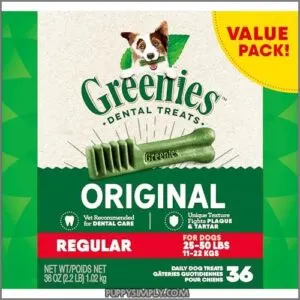
Greenies Original Regular Dental Dog Treats offer your Labradoodle a tasty way to maintain oral health between professional cleanings.
These veterinarian-recommended treats reduce plaque by 60% and decrease gingivitis scores by 33% after just 28 days of daily use.
You’ll find they’re perfectly sized for medium breeds like Labradoodles, containing 90 calories per treat with natural ingredients and essential vitamins.
While they won’t replace regular brushing, they provide convenient dental care that 94% of veterinarians recommend for companion dogs, making them a great addition to your Labradoodle’s oral health routine with daily use.
Best For: Labradoodle owners seeking a veterinarian-recommended daily dental treat that reduces plaque and gingivitis while providing convenient oral care between professional cleanings.
- Clinically proven to reduce plaque by 60% and decrease gingivitis scores by 33% after 28 days of daily use
- Made with natural, easy-to-digest ingredients and fortified with vitamins and minerals for overall health
- Highly rated by both veterinarians (94% recommend) and consumers (4.8/5 stars from 6,100 reviews)
- Higher price point compared to alternative dental treats, though quality may justify the cost
- Quick consumption by some dogs may reduce the mechanical cleaning effectiveness
- Cannot replace regular tooth brushing and should only complement a complete oral care routine
Homemade Dog Food Benefits
When you make homemade food for your Labradoodle, you gain complete control over every ingredient that goes into their bowl.
This approach lets you address specific dietary needs while supporting your dog’s overall health and energy levels.
Enhanced Control Over Ingredients
Control over ingredient sourcing transforms homemade DIY dog food preparation into a precise science.
You’ll eliminate mystery additives while ensuring freshness assurance through careful recipe customization that supports effective allergy management for your Labradoodle’s unique needs.
Including fiber-rich vegetables can also aid in weight management.
- Ingredient Sourcing: Select high-quality proteins and vegetables from trusted suppliers
- Avoiding Additives: Skip artificial preservatives, colors, and flavor enhancers completely
- Recipe Customization: Adjust portions based on your dog’s specific nutritional requirements
- Allergy Management: Remove problematic ingredients that trigger sensitivities or reactions
Catering to Specific Dietary Needs
Homemade labradoodle diet allows you to address specific allergies and sensitivities that commercial foods can’t accommodate.
You’ll manage weight issues through portion control and ingredient selection. DIY dog food recipes work perfectly for puppy needs requiring different nutrition ratios.
Senior diets benefit from customized protein levels and joint-supporting ingredients. Healthy labradoodle food addresses individual labradoodle allergies effectively, allowing for a customized approach to their diet.
Improved Overall Well-being
Proper nutrition through balanced dog food improves your Labradoodle’s coat health, reducing allergies and supporting joints.
Quality dog food ingredients boost digestive health and increase energy levels.
Homemade labradoodle treats with ideal dog nutrition help maintain your dog’s vitality, enhance immune function, and promote longevity through carefully selected nutrients, which is crucial for your Labradoodle’s overall vitality.
Labradoodle Homemade Food Risks
While you can prepare nutritious meals for your Labradoodle at home, this approach comes with significant risks if not done properly.
Without careful planning and veterinary guidance, homemade diets can lead to serious nutritional deficiencies that may harm your dog’s health over time, which is why careful planning is crucial to avoid serious health issues.
Health Risks of Homemade Dog Food
Walking a nutritional tightrope, you’ll face several serious risks feeding homemade meals to your Labradoodle.
Nutrient deficiencies plague most DIY recipes, leaving dogs lacking essential vitamins and minerals for ideal dog nutrition. Bacterial contamination from improper handling threatens immediate digestive issues, while ingredient toxicity from common household foods poses life-threatening dangers.
Most homemade dog food recipes lack proper nutrition, risking your Labradoodle’s long-term health and vitality.
Recipe imbalance creates long-term Labradoodle health problems, making professional guidance essential for dog food ingredients selection.
Many owners find that control over ingredients is a major benefit.
Nutrient Balance Considerations
Creating balanced macronutrient ratios becomes your biggest challenge when making Labradoodle food at home.
You’ll need to hit specific targets: 18-25% protein, 10-15% fat, and up to 50% carbohydrates for ideal dog nutrition.
Understanding essential dog nutrients is vital for your pet’s health, and ensuring you meet AAFCO guidelines is crucial.
Without careful recipe adjustments and supplementation needs for vitamin sources and mineral importance, your well-meaning meals might miss these guidelines completely.
Consulting a Veterinarian
Before making homemade dog food, you’ll want your veterinarian’s blessing. Professional guidance helps guarantee your Labradoodle gets the best dog nutrition while avoiding potential dog health issues. Your vet’s expertise becomes invaluable when addressing specific health conditions requiring dietary adjustments.
Consider these key discussion points with your vet:
- Recipe approval for balanced nutrition meeting your dog’s needs
- Identifying potential dog allergies or food sensitivities
- Monitoring existing health conditions that affect diet choices
- Creating meal plans for different life stages and activity levels
- Establishing regular check-ups to assess your dog’s nutritional health
Veterinary care guarantees your homemade recipes support rather than compromise your Labradoodle’s wellbeing.
Frequently Asked Questions (FAQs)
What’s the best food to feed a Labradoodle?
You’ll want high-quality dog food with balanced protein, healthy fats, and essential nutrients. Look for brands specifically formulated for medium-to-large active breeds, avoiding fillers and artificial additives.
How do you make homemade dog food for Labradors?
Like building blocks for a healthy foundation, you’ll combine lean protein (chicken, turkey, fish), complex carbs (brown rice, sweet potatoes), and vegetables (carrots, peas) in balanced proportions.
Always consult your veterinarian first, to ensure the combination of lean protein, complex carbs, and vegetables is suitable for your needs.
What do vets recommend for homemade dog food?
Veterinarians typically recommend consulting a canine nutritionist before making homemade dog food. They emphasize proper balance of proteins, fats, carbohydrates, vitamins, and minerals for safety.
What can a Labradoodle not eat?
Labradoodles can’t eat chocolate, grapes, raisins, onions, garlic, xylitol (artificial sweetener), macadamia nuts, avocados, or cooked bones.
These foods cause serious health problems ranging from poisoning to choking hazards that require immediate veterinary attention, including immediate veterinary attention.
Are there any specific fruits or vegetables that are beneficial or harmful to Labradoodles?
Picture your Labradoodle enthusiastically eyeing your fruit bowl—some treats spell danger while others boost their health.
Avoid grapes, raisins, and cherries which can cause kidney failure.
Offer safe options like blueberries, carrots, and sweet potatoes for vitamins and fiber.
Can I incorporate grains into my Labradoodle’s homemade dog food?
Yes, you can include grains in homemade dog food. Brown rice, oats, and quinoa provide carbohydrates and fiber. Cook grains thoroughly and introduce gradually to avoid digestive upset.
What toxic foods should Labradoodles absolutely avoid?
Never feed your Labradoodle chocolate, grapes, raisins, onions, garlic, xylitol (artificial sweetener), avocado, macadamia nuts, or alcohol. These foods can cause serious poisoning, organ damage, or death in dogs.
Can Labradoodles eat raw homemade dog food?
Many dog parents wonder about raw diets, and you’re right to ask.
Labradoodles can eat raw homemade food, but it requires careful planning, proper handling, and veterinary guidance to guarantee nutritional balance and food safety, ensuring a nutritional balance.
How to transition from commercial to homemade food?
Start slowly by replacing 25% of your dog’s current food with homemade portions. Gradually increase the homemade ratio over 7-10 days while monitoring for digestive upset, ensuring a smooth adjustment period.
What kitchen equipment is needed for preparation?
Sharp knives, cutting boards, food processors, measuring cups, and storage containers form your essential toolkit.
You’ll also need mixing bowls, slow cookers, and freezer-safe containers for batch preparation and proper food safety.
Conclusion
Like a master chef perfecting their signature dish, creating labradoodle homemade dog food requires patience, knowledge, and careful attention to detail.
You’ll transform your pup’s health by controlling every ingredient that goes into their bowl.
Remember to switch gradually, monitor their response, and consult your veterinarian about proper nutrient ratios.
With the right recipes and safety knowledge, you’re giving your labradoodle the foundation for a vibrant, energetic life ahead.
- https://snowyriverdoodle.com/labradoodle-nutrition-myths-facts/
- https://vetslovepets.com.au/blogs/dog/labradoodle-feeding-guide
- https://iheartdogs.com/ideal-diet-for-labradoodles-the-ultimate-labradoodle-feeding-guide/
- https://allaboutthedoodles.com/blogs/what-should-i-know-about-labradoodle-dietary-needs-at-different-life-stages
- https://www.heartrocklabradoodles.com/post/happy-tummies-healthy-pups-life-s-abundance-for-australian-labradoodles

